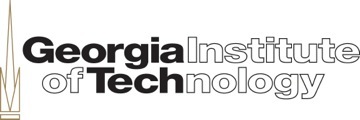

Interfacing materials. Interfacing disciplines.
Personal Profile
Home | PI Info | Research | Publications | Mentoring/Outreach | Links

Biography
Mark is a native “Pittsburgher”. After completing his B.S. degree in Materials Science & Engineering at Penn State University, he joined Jon-Paul Maria’s lab at NC State University studying thin film science. While still in graduate school, Mark also initiated a cross-disciplinary research project with colleagues in the Chemistry department studying interfaces between self-assembled monolayers (SAMs) and conductive oxides for plasmonic sensing. Fascinated by organic/inorganic interfaces, Mark pursued a postdoctoral position with the Braun group at the University of Illinois to gain expertise in soft matter and chemical synthesis and to continue to focus on collaborative research interfacing diverse disciplines. Now as a Research Assistant Professor of Chemical Engineering, Mark manages NC State’s research efforts as part of the Research Triangle Solar Fuels Institute (RTSFI), a multi-institutional research collaboration between NC State, UNC Chapel Hill, Duke University, and RTI International, with the goal of developing sustainable technologies for converting solar energy into liquid fuels.
Mark D. Losego
Assistant Professor
Materials Science and Engineering
Georgia Institute of Technology
Office: Love Manufacturing Building
Phone:
E-mail: losego at gatech.edu
Education
-
• Ph.D., Materials Science & Engineering
North Carolina State University (2008)
-
• M.S., Materials Science & Engineering
North Carolina State University (2005)
-
• B.S., Materials Science & Engineering
Penn State University (2003)
Experience
-
• North Carolina State University – Raleigh, NC (2011-present)
Research Assistant Professor with the Parsons Group -
• University of Illinois Urbana-Champaign – Urbana, IL (2008-2011)
Postdoctoral Researcher with Paul V. Braun -
• North Carolina State University – Raleigh, NC (2003-2008)
NSF Graduate Research Fellow with Jon-Paul Maria
Ph.D. Thesis: Interfacing Epitaxial Oxides to Gallium Nitride
M.S. Thesis: Chemical Solution Deposition of PZT Thin Films Directly on Copper Surfaces -
• Penn State University – University Park, PA (2002-2003)
Undergraduate Thesis Research with Susan Trolier-McKinstry
B.S. Thesis: Mist Deposition of Micron-Thick Sol-Gel PZT Thin Films -
• Oak Ridge National Lab – Oak Ridge, TN (Summer 2002)
Undergraduate Researcher in Microwave Processing, Mentor: Terry N. Tiegs -
• Carpenter Technologies – Reading, PA (Summer 2001)
Engineer Intern, Steel Wire & Steel Strip Finishing Division -
• Penn State University – University Park, PA (Summer 2000)
REU Researcher in Surface Chemistry Laboratory, Mentor: Erwin A. Vogler
Awards
-
•Materials Research Society Graduate Student Silver Award (2008)
-
-
•National School on Neutron and X-ray Scattering (Best Presentation; Argonne 2007)
-
-
•Conference of Southern Graduate Schools Best Master’s Thesis Award (2007)
-
-
•American Ceramic Society Electronics Division Best Student Presentation (2007)
-
-
•National Science Foundation Graduate Research Fellowship (2003)
-
-
•Winner of the American Ceramic Society Student Speaking Contest (2003)
-
-
•Student Marshall for the College of Earth and Mineral Sciences, Penn State (2003)
-
-
•The Ellen Steidle Award for Service to the College of Earth & Mineral Sciences (2002)

Research Tools

Oxide MBE and sputtering cluster tool constructed & used during Mark’s Ph.D. thesis.
Mark at Brookhaven National Lab’s U7A synchrotron beamline conducting NEXAFS spectroscopy measurements on SAMs.
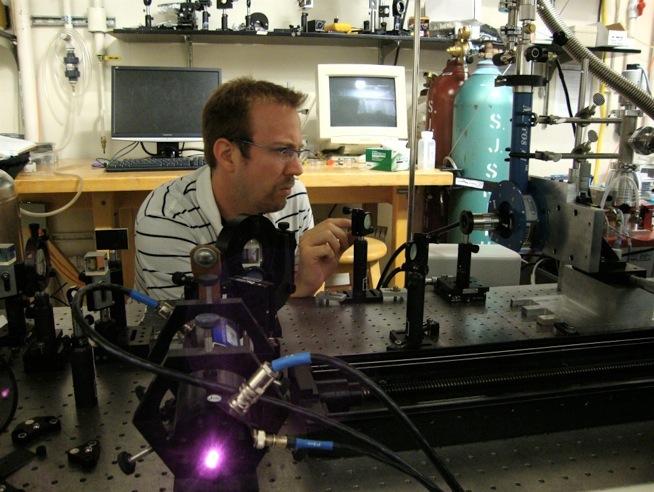
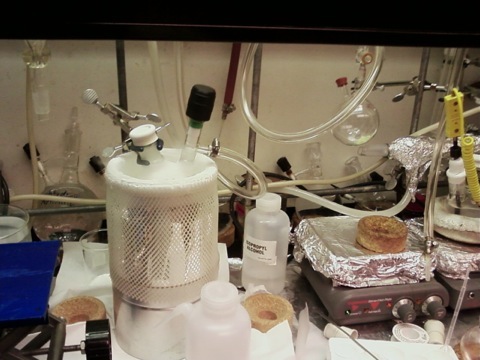
Mark using the ultrafast pump-probe tool at the UIUC MRL to measure nanoscale heat transport.

Electrical measurements for assessing electronic transport and dielectric performance.


Chemical synthesis of small molecules, sol-gel thin films, colloids, and polymer brushes.
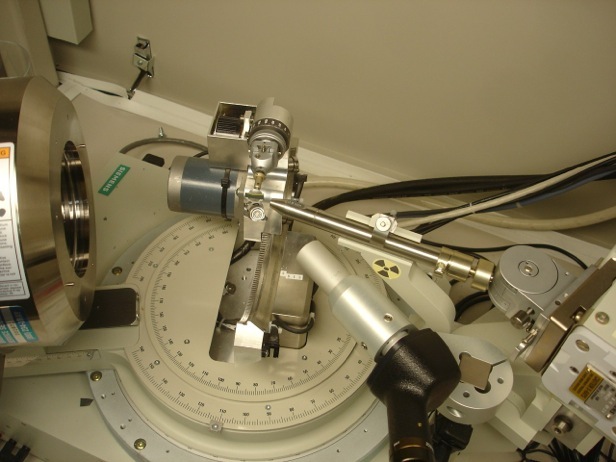
Mark has broad expertise in materials and surface characterization, including XRD (pictured), SEM, AFM, ellipsometry, and various spectroscopies.

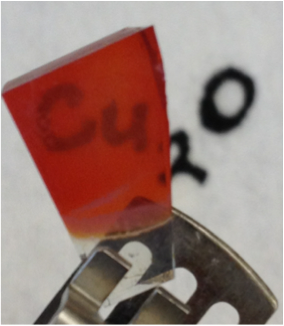
Ultrafast Spectroscopy
Chemical Synthesis / Polymerization
Electrical Characterization
UHV Construction & Thin Film Processing
Synchrotron Scattering
Materials Characterization
Electrochemistry / Photoelectrochemistry
Soft Matter Fabrication Techniques
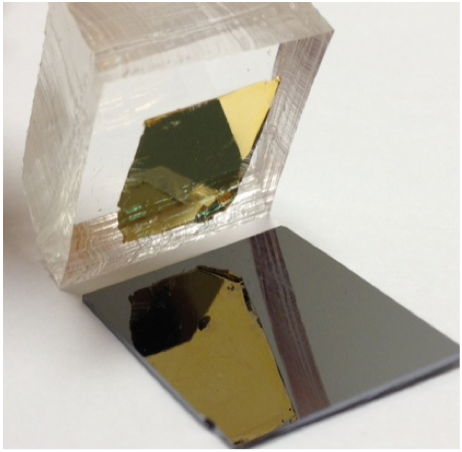
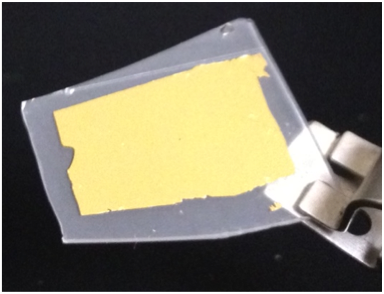
Electrochemical methods are used to both fabricate materials and study photoelectrochemical processes for generating H2 fuel from solar energy.
Transfer-printing (shown), nano-imprint lithography, & nano-sphere lithography are being used to generate novel systems that address problems in diverse fields including heat transport & energy storage.

